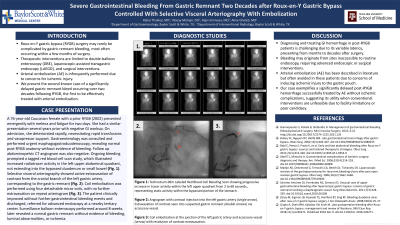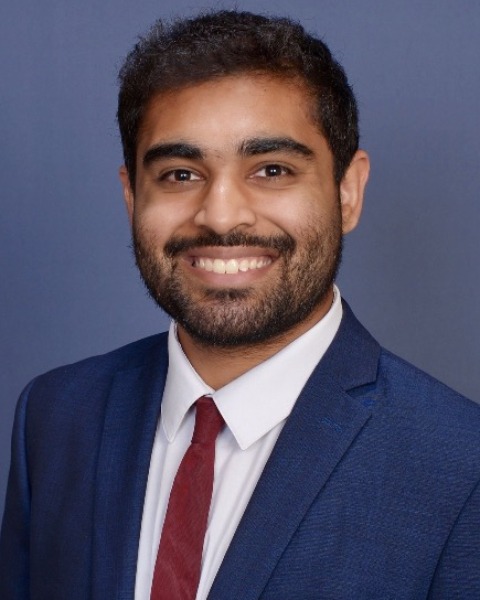Sunday Poster Session
Category: GI Bleeding
P0797 - Severe Gastrointestinal Bleeding From Gastric Remnant Two Decades after Roux-en Y Gastric Bypass Controlled With Selective Visceral Arteriography With Embolization
Sunday, October 27, 2024
3:30 PM - 7:00 PM ET
Location: Exhibit Hall E

Has Audio

Rahul R. Thakkar, MD
Baylor Scott & White Medical Center
Round Rock, TX
Presenting Author(s)
Rahul R. Thakkar, MD, Wasay A. Mohajir, DO, Rajiv Srinivasa, MD, Bilal Shaikh, DO, Aline Ghaleb, MD
Baylor Scott & White Medical Center, Round Rock, TX
Introduction: Roux-en-Y gastric bypass (RYGB) surgery may rarely be complicated by gastric remnant bleeding, most often occurring within a few months of surgery. Therapeutic interventions are limited to double-balloon enteroscopy (DBE), laparoscopic-assisted transgastric endoscopy (LAEGD), and surgical interventions. Arterial embolization (AE) is infrequently performed due to concerns for ischemic injury. We present the second known case of a significantly delayed gastric remnant bleed occurring over two decades following RYGB, the first to be effectively treated with AE.
Case Description/Methods: A 76-year-old Caucasian female with a prior RYGB (2002) presented emergently with melena and fatigue for two days. She had a similar presentation several years prior with negative GI workup. On admission, she deteriorated rapidly, necessitating rapid transfusions and vasopressor support. Gastroenterology was consulted and performed urgent esophagogastroduodenoscopy, revealing normal post-RYGB anatomy without evidence of bleeding. Follow up abdominopelvic CT angiogram was also negative. Ongoing bleeding prompted a tagged red blood cell scan study, which illustrated increased radiotracer activity in the left upper abdominal quadrant, not extending into the bypassed duodenum or small bowel (Fig. 1). Selective visceral arteriography showed active extravasation of contrast from the cranial branch of the left gastric artery, corresponding to the gastric remnant (Fig. 2). Coil embolization was performed using four detachable micro-coils, with no further extravasation on repeat arteriogram (Fig. 3). The patient clinically improved without further GIB events and discharged, referred for advanced endoscopy at a nearby tertiary center. Surveillance balloon enteroscopy 8-weeks later revealed a normal gastric remnant with no bleeding, luminal abnormalities, or ischemia.
Discussion: Diagnosing and treating GI hemorrhage in post-RYGB patients is challenging due to its variable latency, presenting from months to decades after surgery. Bleeding may originate from sites inaccessible to routine endoscopy, requiring advanced endoscopic or surgical interventions. AE has been described in literature but often avoided in these patients due to concerns of inducing ischemic injury to the gastric pouch. Our case exemplifies a significantly delayed post-RYGB hemorrhage successfully treated by AE without ischemic complications, suggesting its utility when conventional interventions are unfeasible due to facility limitations or poor candidacy.

Disclosures:
Rahul R. Thakkar, MD, Wasay A. Mohajir, DO, Rajiv Srinivasa, MD, Bilal Shaikh, DO, Aline Ghaleb, MD. P0797 - Severe Gastrointestinal Bleeding From Gastric Remnant Two Decades after Roux-en Y Gastric Bypass Controlled With Selective Visceral Arteriography With Embolization, ACG 2024 Annual Scientific Meeting Abstracts. Philadelphia, PA: American College of Gastroenterology.
Baylor Scott & White Medical Center, Round Rock, TX
Introduction: Roux-en-Y gastric bypass (RYGB) surgery may rarely be complicated by gastric remnant bleeding, most often occurring within a few months of surgery. Therapeutic interventions are limited to double-balloon enteroscopy (DBE), laparoscopic-assisted transgastric endoscopy (LAEGD), and surgical interventions. Arterial embolization (AE) is infrequently performed due to concerns for ischemic injury. We present the second known case of a significantly delayed gastric remnant bleed occurring over two decades following RYGB, the first to be effectively treated with AE.
Case Description/Methods: A 76-year-old Caucasian female with a prior RYGB (2002) presented emergently with melena and fatigue for two days. She had a similar presentation several years prior with negative GI workup. On admission, she deteriorated rapidly, necessitating rapid transfusions and vasopressor support. Gastroenterology was consulted and performed urgent esophagogastroduodenoscopy, revealing normal post-RYGB anatomy without evidence of bleeding. Follow up abdominopelvic CT angiogram was also negative. Ongoing bleeding prompted a tagged red blood cell scan study, which illustrated increased radiotracer activity in the left upper abdominal quadrant, not extending into the bypassed duodenum or small bowel (Fig. 1). Selective visceral arteriography showed active extravasation of contrast from the cranial branch of the left gastric artery, corresponding to the gastric remnant (Fig. 2). Coil embolization was performed using four detachable micro-coils, with no further extravasation on repeat arteriogram (Fig. 3). The patient clinically improved without further GIB events and discharged, referred for advanced endoscopy at a nearby tertiary center. Surveillance balloon enteroscopy 8-weeks later revealed a normal gastric remnant with no bleeding, luminal abnormalities, or ischemia.
Discussion: Diagnosing and treating GI hemorrhage in post-RYGB patients is challenging due to its variable latency, presenting from months to decades after surgery. Bleeding may originate from sites inaccessible to routine endoscopy, requiring advanced endoscopic or surgical interventions. AE has been described in literature but often avoided in these patients due to concerns of inducing ischemic injury to the gastric pouch. Our case exemplifies a significantly delayed post-RYGB hemorrhage successfully treated by AE without ischemic complications, suggesting its utility when conventional interventions are unfeasible due to facility limitations or poor candidacy.

Figure: Figure 1: Technetium-99m Labeled Red Blood Cell Bleeding Scan showing progressive increase in tracer activity within the left upper quadrant from 2 to 60 seconds, representing static activity within the bypassed portion of the stomach.
Figure 2: Angiogram with contrast injection into the left gastric artery (single arrow). Extravasation of contrast seen into suspected gastric remnant (double arrows) via accessory vessel.
Figure 3: Coil embolization at the junction of the left gastric artery and accessory vessel (arrow) with resolution of contrast extravasation.
Figure 2: Angiogram with contrast injection into the left gastric artery (single arrow). Extravasation of contrast seen into suspected gastric remnant (double arrows) via accessory vessel.
Figure 3: Coil embolization at the junction of the left gastric artery and accessory vessel (arrow) with resolution of contrast extravasation.
Disclosures:
Rahul Thakkar indicated no relevant financial relationships.
Wasay Mohajir indicated no relevant financial relationships.
Rajiv Srinivasa indicated no relevant financial relationships.
Bilal Shaikh indicated no relevant financial relationships.
Aline Ghaleb indicated no relevant financial relationships.
Rahul R. Thakkar, MD, Wasay A. Mohajir, DO, Rajiv Srinivasa, MD, Bilal Shaikh, DO, Aline Ghaleb, MD. P0797 - Severe Gastrointestinal Bleeding From Gastric Remnant Two Decades after Roux-en Y Gastric Bypass Controlled With Selective Visceral Arteriography With Embolization, ACG 2024 Annual Scientific Meeting Abstracts. Philadelphia, PA: American College of Gastroenterology.
